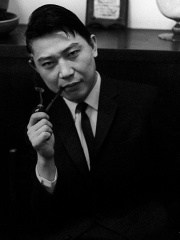
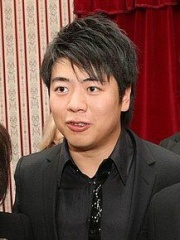
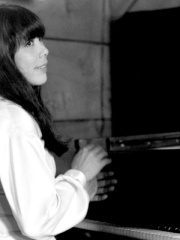

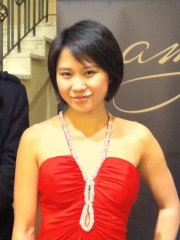
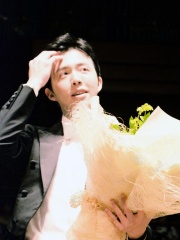
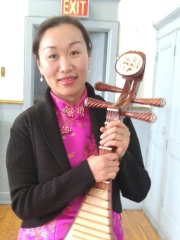

The Most Famous
MUSICIANS from China
Top 10
The following people are considered by Pantheon to be the top 10 most legendary Chinese Musicians of all time. This list of famous Chinese Musicians is sorted by HPI (Historical Popularity Index), a metric that aggregates information on a biography's online popularity. Visit the rankings page to view the entire list of Chinese Musicians.

1. Fou Ts'ong (1934 - 2020)
With an HPI of 61.06, Fou Ts'ong is the most famous Chinese Musician. His biography has been translated into 21 different languages on wikipedia.
Fou Ts'ong (Chinese: 傅聰; pinyin: Fù Cōng; 10 March 1934 – 28 December 2020) was a Chinese and British pianist who was the first pianist of his national origin to achieve international recognition. He came to prominence after winning third prize and the Polish Radio Prize for the best performance of Chopin's mazurkas in the 1955 V International Chopin Piano Competition, and remained particularly known as an interpreter of Chopin's music.

2. Lang Lang (b. 1982)
With an HPI of 60.72, Lang Lang is the 2nd most famous Chinese Musician. His biography has been translated into 46 different languages.
Lang Lang (Chinese: 郎朗; pinyin: Láng Lǎng; born 14 June 1982) is a Chinese Manchu pianist who has performed with major orchestras around the world and appeared at many leading concert halls. Active since the 1990s, he was the first Chinese pianist to be engaged by the Berlin Philharmonic, the Vienna Philharmonic and many of the top American orchestras. In 2000, a Chicago Tribune music critic called him "the biggest, most exciting young keyboard talent I have encountered in many a year of attending piano recitals." He was also a judge on the first two series of the British music competition television series The Piano.

3. Toshiko Akiyoshi (b. 1929)
With an HPI of 59.51, Toshiko Akiyoshi is the 3rd most famous Chinese Musician. Her biography has been translated into 23 different languages.
Toshiko Akiyoshi (秋吉敏子 or 穐吉敏子, Akiyoshi Toshiko; born 12 December 1929) is a Japanese jazz pianist, composer, arranger, and bandleader. Akiyoshi received fourteen Grammy Award nominations and was the first woman to win Best Arranger and Composer awards in Down Beat magazine's annual Readers' Poll. In 1984, she was the subject of the documentary Jazz Is My Native Language. In 1996, she published her autobiography, Life with Jazz, and in 2007 she was named an NEA Jazz Master by the U.S. National Endowment for the Arts.

4. Cui Jian (b. 1961)
With an HPI of 53.45, Cui Jian is the 4th most famous Chinese Musician. His biography has been translated into 20 different languages.
Cui Jian (Chinese: 崔健; Korean: 최건; born 2 August 1961) is a Chinese singer-songwriter and musician. Known for his countercultural impact, he has launched a ground-breaking musical trend of Chinese rock and pop, dubbed the "Godfather of Chinese Rock". With poetic, socially conscious lyrics, his experimental approach features multiple traditional instruments, eclectic musical elements and cultural references from different eras. Cui is widely deemed the most influential rock musician in China as well as one of the greatest and most prominent figures in Chinese music. Born into an ethnic Korean family with parents who were both artists, Cui began his musical career as a classically trained trumpeter before switching to guitar. He rose to prominence with his single "Nothing to My Name", which mixed rock and roll and xintianyou and became an instant hit in 1986. A pioneer of the country's alternative music, he challenged the dominant culture, earning a cult following on China's university campuses while also facing backlash from social conservatives. This was followed by the unprecedented success of Rock 'n' Roll on the New Long March (1989), generally acclaimed as China's first rock album, which heralded him as the "spokesperson for his generation". However, for more than a decade, his performing in Beijing was on-off interdicted, partly because of his activist role in the 1989 Tiananmen Square protests. He consolidated his fame with less commercial and more sophisticated Solution (1991) and Balls Under the Red Flag (1994), the latter of which is considered by critics to be his magnum opus. Later he shifted towards electronic and rap-oriented avant-rock on The Power of the Powerless (1998) and Show You Colour (2005), and returned to a folk and blues rock style with Frozen Light (2015) and A Flying Dog (2021). According to Billboard magazine, Cui is estimated to have sold 100 million albums, although the vast majority have been pirated copies. In 2009, he was voted the sixth most influential Chinese singer of the past 60 years in a China Internet Information Center history poll. At the 2010 Chinese Music Awards, he was ranked among the 30 greatest Chinese artists of the past 30 years. Cui has also been involved in other projects including music directing and filmmaking. Since the 1993 underground movie Beijing Bastards, he has worked on several films as an investor, composer, screenwriter, guest star, and producer; he also directed the musical Blue Sky Bones. Despite his many denials, Cui's actions and work have led him to be often portrayed as a dissident. His international acclaim is always tied to his public persona with political overtones, which frequently downplays his musical achievements.

5. Coco Lee (1975 - 2023)
With an HPI of 53.15, Coco Lee is the 5th most famous Chinese Musician. Her biography has been translated into 29 different languages.
CoCo Lee (Chinese: 李玟; 17 January 1975 – 5 July 2023) was a Chinese-American singer, songwriter, and actress. She is one of the best-selling artists in Asia and is widely regarded as a significant figure and a diva. Her career began in 1993 in Hong Kong, and she gained early fame in Taiwan through a series of successful albums, establishing herself as an icon. She released 18 studio albums, 2 live records, and 5 compilations. Lee, who was described as the "Asian Mariah Carey", was noted for her Americanized dance routines. She voiced the lead character of Fa Mulan in the Mandarin version of the 1998 Disney film Mulan and sang its theme song, "Reflection". Lee was the first Chinese singer to have music released globally, making her the first Chinese singer to break into the western market. Her 1999 album Just No Other Way was the first ever English-language album recorded by a Chinese singer. Her 2000 single "Do You Want My Love" achieved international success, appearing on the US Billboard Hot Dance Breakouts Chart at No. 4 and entering the top 50 of the US Billboard Dance Club Songs Chart while also peaking at No. 14 on the Australian Singles Chart and No. 20 on the Official Chart in New Zealand. Her 2000 song "A Love Before Time", from the film Crouching Tiger, Hidden Dragon, was nominated for the Academy Award for Best Original Song, and she performed it at the 73rd Academy Awards, becoming the first, and so far only, Chinese artist to perform at the Oscars. Lee was also the first Asian-American singer to sing the US National Anthem at an NBA game, the first Asian singer to hold a concert at the Walt Disney Concert Hall in Los Angeles, the first non-mainland Chinese singer to win the Chinese singing reality show I Am a Singer, and the first Asian brand ambassador for Chanel. Lee died by suicide in Hong Kong, at the age of 48.

6. Yuja Wang (b. 1987)
With an HPI of 53.00, Yuja Wang is the 6th most famous Chinese Musician. Her biography has been translated into 28 different languages.
Yuja Wang (Chinese: 王羽佳; pinyin: Wáng Yǔjiā; born February 10, 1987) is a Chinese-born American pianist. She began learning piano there at age six, and went on to study at the Central Conservatory of Music in Beijing and the Curtis Institute of Music in Philadelphia. By age 21, she was already an internationally recognized concert pianist and signed an exclusive contract with Deutsche Grammophon. Wang currently lives in New York.

7. Li Yundi (b. 1982)
With an HPI of 48.05, Li Yundi is the 7th most famous Chinese Musician. His biography has been translated into 29 different languages.
Yundi Li (simplified Chinese: 李云迪; traditional Chinese: 李雲迪; pinyin: Lǐ Yúndí; born 7 October 1982), also known simply as Yundi (stylized as YUNDI), is a Chinese classical concert pianist. Yundi is considered one of the greatest contemporary interpreters of Chopin and is also especially known for his interpretations of Liszt and Prokofiev. Yundi rose to fame for being the youngest pianist, at the age of eighteen, to win first prize at the International Chopin Piano Competition in 2000. In 2015, he also served as the competition's youngest-ever juror. In recognition to his contribution to Chopin pieces, the Polish government awarded Yundi with the world's first Chopin passport (Chopinowskie paszporty). Yundi is also the first Chinese recipient of both Silver (2010) and Gold (2019) Medal for Merit to Culture - Gloria Artis issued by the Ministry of Culture and National Heritage of Polish government, in regards to his contribution to both music and Polish culture. Yundi has promoted Chinese national music worldwide, as well as the development of classical music in China, both by his influence and philanthropy.

8. Liu Fang (b. 1974)
With an HPI of 45.93, Liu Fang is the 8th most famous Chinese Musician. Her biography has been translated into 19 different languages.
Liu Fang (Chinese: t 劉芳, s 刘芳, p Liú Fāng; b. 1974) is a Chinese–Canadian musician who is one of the most prominent pipa players in the world. Described in the media as the "empress of pipa" (L'actualité), "divine mediator" (World), "the greatest ambassadress of the art of the pipa", Liu Fang is known as "possessing virtuoso technique, grace and a unique empathy toward the music she plays – whether it is a traditional and folk tune or a modern Western composition" (All Music Guide). "She has an extraordinary focused, poised presence in her manner and her playing. In a lesser player this is just a trained formality; the body of material and techniques for her instruments is extremely highly developed, passed down through centuries. But Liu Fang’s total devotion to her playing has moved her beyond perfect execution to the creativity and flexibility that marks a true musician."(in the fRoots Magazine, 06.2006).

9. The8 (b. 1997)
With an HPI of 44.86, The8 is the 9th most famous Chinese Musician. His biography has been translated into 19 different languages.
Xu Minghao (Chinese: 徐明浩; Korean: 서명호; born November 7, 1997), known professionally as The8 (디에잇; also stylized as The 8), is a Chinese singer and dancer based in South Korea. Managed by Pledis Entertainment, he is a member of the South Korean boy band Seventeen and its performance team. In 2018, he had his official solo debut with the release of "Night and Rain" and served as one of the two dance mentors in the Chinese survival show Youth With You. In 2024, he released his first EP titled Stardust.

10. Hua Chenyu (b. 1990)
With an HPI of 42.16, Hua Chenyu is the 10th most famous Chinese Musician. His biography has been translated into 15 different languages.
Hua Chenyu (Chinese: 华晨宇; born February 7, 1990) is a Chinese singer and songwriter. First debuting as the winner of Super Boy 2013, he gained widespread recognition for his vocal ability and stage performances after participating in Singer 2018. Hua's sunrise concert held in Yantai in May 2024 attracted over 130,000 people in one show, making it one of the most-attended concerts of all-time. In September 2023, his concerts at the Beijing National Stadium saw over 100,000 people for two consecutive days.
People
Pantheon has 11 people classified as Chinese musicians born between 1929 and 1998. Of these 11, 9 (81.82%) of them are still alive today. The most famous living Chinese musicians include Lang Lang, Toshiko Akiyoshi, and Cui Jian. The most famous deceased Chinese musicians include Fou Ts'ong, and Coco Lee. As of April 2024, 1 new Chinese musicians have been added to Pantheon including The8.
Living Chinese Musicians
Go to all RankingsLang Lang
1982 - Present
HPI: 60.72
Toshiko Akiyoshi
1929 - Present
HPI: 59.51
Cui Jian
1961 - Present
HPI: 53.45
Yuja Wang
1987 - Present
HPI: 53.00
Li Yundi
1982 - Present
HPI: 48.05
Liu Fang
1974 - Present
HPI: 45.93
The8
1997 - Present
HPI: 44.86
Hua Chenyu
1990 - Present
HPI: 42.16
Cai Xukun
1998 - Present
HPI: 40.03


